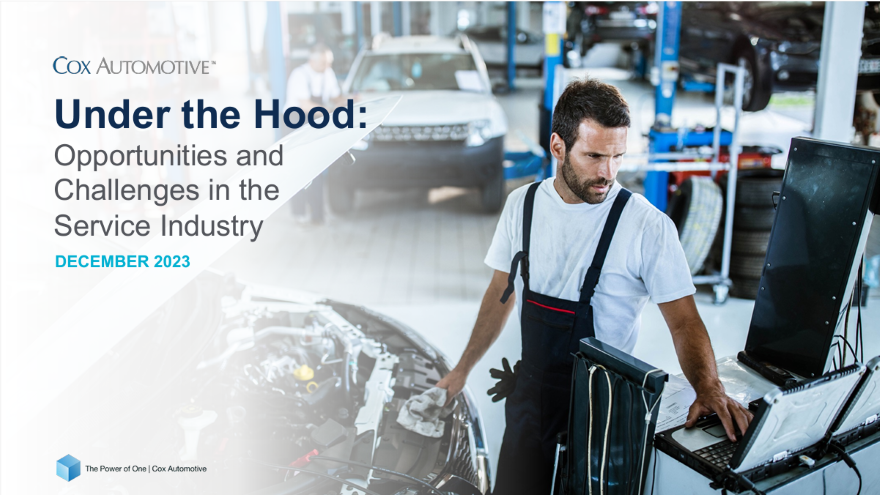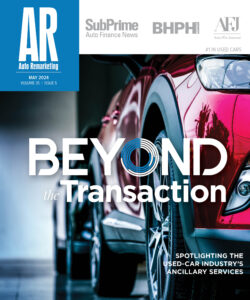Cox study shows dealership service lanes losing market share, consumer trust

Image courtesy of Cox Automotive.
Dealership service departments are not only losing market share to general repair shops — they’re also losing the trust of consumers, according to the latest research by Cox Automotive.
Cox’s new study, “Under the Hood: Opportunities and Challenges in the Service Industry,” found that while franchised dealerships are still vehicle owners’ top choice among service providers, their lead over service chains such as quick lube locations and service centers is shrinking.
The report showed dealership service lanes accounted for 30% of all service visits in the U.S. in 2023, down from 35% in the most recent previous survey in 2021. General repair shops and service stations were a close second at 28%, with tire repair stores, body shops, specialists and other locations accounting for the rest.
Even more striking is that 33% of vehicle owners selected general repair shops as their preferred service provider, pushing that category ahead of dealers for the first time. Dealerships were preferred by 31% of the respondents, down from 35% in 2021.
That shift is driven at least in part by a decline in trust, the Cox report said. Asked why they returned to the dealership where they purchased their vehicle for service, 54% of respondents gave trust as a reason, a drop from 62% two years ago.
The study showed those who selected trust as a reason are more likely to be very satisfied with the service experience and more loyal to the dealer than those who did not.
The study’s results are based on a survey conducted in the second half of 2023 of 2,493 vehicle owners — including 182 electric vehicle owners — who had at least one service performed in the previous 12 months, accounting for more than 5,500 service visits.
In addition, employees with decision-making authority over fixed operations at 525 franchised dealers were interviewed.
The report from Cox Automotive said vehicle owners are driving more and holding onto their vehicles longer because of high vehicle prices and interest rates. As a result, they’re bringing their vehicle in for service or maintenance more often: an average of 2.5 times a year, up from 2.3 in 2021 but down from 2.8 in the pre-pandemic 2018 survey.
“The service business continues to be a key part of any dealership operation,” Cox Automotive senior manager of market and customer research Vanessa Ton said in a news release. “While our report lays clear some of the challenges facing service providers today, the good news is that the industry continues to grow, with more customers going in for service visits, and most providers are seeing a boost in revenue for service.”
As with practically every other industry, automotive care and service costs have risen noticeably, with Cox’s research showing a 45% increase in the average price per service visit since 2021.
So, it’s no surprise that four of the top five reasons vehicle owners cited for not returning to a dealership for service were cost-related. The survey also found dealers believe one of the top reasons new car owners don’t return to them for service is a fear of being overcharged.
But the report showed dealership service costs mostly in line with other service providers, with the average dealership service visit in 2023 costing $258, just $9 more than the $249 average for a non-dealer service provider.
Still, 48% of vehicle owners said they were frustrated with at least one aspect of their recent service experience at a dealership, citing longer than expected waits, dealers pushing additional services, struggles to schedule an appointment and higher-than-estimated prices for the work done.
Price and long waits were among the issues that frustrated electric vehicle owners, the study found, but one major one was the amount of service visits EVs require.
While only 28% of dealers believe EVs require more service than internal combustion engine vehicles, Cox’s report showed the average EV owner visited a service center 2.6 times with 2.8 services performed per visit, compared to the 2.3 and 2.4 for the average gas vehicle. And EV owners spent more time waiting for maintenance (34 minutes longer) and repair work (51 minutes longer) compared to gas vehicle owners.
“There is a general expectation that EVs don’t require service or have minimal service needs, but that is not the case,” Cox Automotive market and customer research manager Kayla Reynolds said. “EVs are new technology and, at this point at least, are in for service more often for warranty work and updates. EVs also tend to require more tire rotation and replacement, as EVs are heavier and harder on their tires.”
Overall, EV owners reported more frustrations with service work than ICE vehicle owners, with finding out how much service costs among the top issues.
According to Cox’s service study, 56% of EV owners (59% of Tesla owners and 50% of all others) said they had at least one frustration with their recent service experience, while just 39% of gas vehicle owners said the same.
“Overall, our latest look at the service industry suggests providers have an opportunity to focus on price transparency and grow trust with their customers,” Ton said. “When it comes to vehicle ownership, repairs and maintenance are important but can present challenges. To overcome those challenges, car dealerships should focus on expanding their service capacity by ensuring they have an adequate number of service bays and well-trained technicians, especially as the demand for electric vehicle services continues to rise.”
You can download a summary of “Under the Hood: Opportunities and Challenges in the Service Industry” here or reserve a copy of the eBook here.

 View The Latest Edition
View The Latest Edition

